As part of our custom bearing solutions for our clients, we design and manufacture plastic gears and geared bearings. Gears are a common an engineering component as bearings and used in as wide a variety of applications. Where bearings facilitate freedom of movement, gears allow an element of control and manipulation of movement and power usage, preventing slipping and increasing operational efficiency.
At BNL, we integrate rolling element bearings with gear forms via injection moulding methods. As a result, the integrated product reduces operating friction, heat and resulting wear, plus debris ingress that causes fouling of the gear or rack operation. Additionally, injection moulded integration provides design flexibility to combine other features such as location mounts, quick release clips and other mating parts.
The benefits of BNL plastic gears and geared bearings are:
- operation with minimum or no lubrication (although they can be lubricated if required)
- quiet, smooth running
- lightweight materials that assist in weight saving and power reduction objectives
- excellent chemical and corrosion resistance
- fewer components and cost through integrated design and injection moulding
- custom-designs to meet specifics of your application
- material combinations and blends can be used to create one product with different characteristics
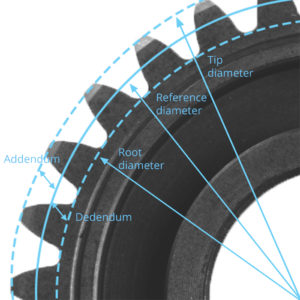
What is a gear module?
The standard measurement for a size of gear or gear teeth is its ‘module’. A gear module is calculated by dividing the reference (or pitch) diameter by the number of teeth.
Module (m#)= Reference diameter/no. of teeth
BNL plastic gears are usually within the m0.75 to m1.5 range, but we can offer gear solution up to m4 depending on application.
Plastic Gear Standards?
We work to ISO standards but collaborate with our customer and their validation team to convert to a different standard grading system where necessary. Our gears generally achieve up to a tolerance class 10 in the ISO 1328 grading system. BNL are a member of the British Gear Association (BGA).
BNL Plastic Gear Types
We offer a range of injection moulded gear solutions, with or without integrated bearings. The most popular is a type of cylindrical gear, but we also make rack gears, belt teeth and gear forms.
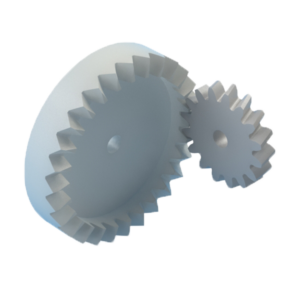 Spur Gears
Spur Gears
- Standard type of gear
- Gears are mounted on parallel axes and transfer movement between two parallel shafts
- Teeth protrude outward from the perimeter
- No thrust force generated in the axial direction
- Wide range of ratios
- Most commonly used gear
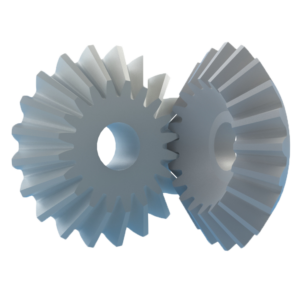 Bevel Gears
Bevel Gears
- Conical in shape with teeth that can be straight cut or spiral
- Spiral cut teeth are smoother and less noisy
- Transfers motion between 2 intersecting axels
- Changes the axis of rotation – 90degrees is most common
- Hypoid bevel gears are like spiral cut bevel gears but can be hyperbolic not conical and are used to transfer motion between 2 axels that do not intersect
- Used in differential drives and found in anything from automotive to power tool applications
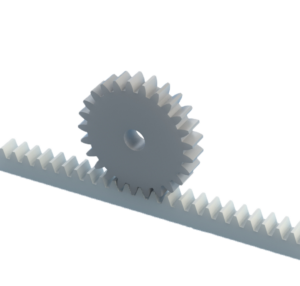 Rack / Rack & Pinion
Rack / Rack & Pinion
- Converts rotary movement into a linear motion.
- Teeth are arranged along a straight bar with a cylindrical mating gear.
- This means one gear axis remains fixed
- Oscillating, short stroke application
- Found in steering systems, conveyors and lifting equipment
Flexible Rack
- These are like a rack gear but the track is thinner and pliable
- Light weight
- Usually made from flexible plastic materials
- Used when an application requires the gear to move over and around objects or components
Internal Gears
- Teeth are cut around the internal diameter of the gear and can also have teeth around the outer diameter too
- A spur gear meshes with the centre teeth and runs around the internal diameter and can have gears running around any outer diameter gear form
- Used in planetary gear mechanisms and can be referred to as ‘planetary gears’
- Very versatile – 2 gears can lock together to create a 1:1 gear ratio
- Commonly used in automotive gear boxes
Belt Teeth & Gear Forms
We design and manufacture belt teeth and gear forms, integrated with the bearing races, to provide a combined solution for many different applications, from CCTV to pool cleaners to mail handling solutions.
Plastic Gear Materials
BNL’s gears are available in two base materials: acetal (POM) and Nylon 6. Our main offering is in POM as long-term dimensional stability as well as high fatigue and chemical resistance over a wide temperature range.
Do you need a specific material? We can tailor material selection to the needs of your application, using additives such as PTFE & aramid fibres, or use two carefully matched materials that can run together, dependent on requirements. We are happy to take any special requests for specific materials or blends.
Where Are Plastic Gears Used? Where can you find them?
- Domestic Appliances
- Cash machines
- Photocopiers
- Mail Handling
- Conveyor Systems and Automation
- Automotive
- Poultry Processing
- Pool cleaners
- CCTV
Do you think a plastic gear or plastic geared bearing might bring advantages to your product development? Contact us about our machine tear down service, where we will examine your product for ways in which our plastic bearings and gears can benefit the performance and efficiency of your product.
Metal Gears vs Plastic Gears: Is your current solution expensive? Are your gears overspecified?
Metal gears can be over-specified in the same way as metal bearings. Designers will may use the top-level gears, even as a starting point, by selecting the highest specification out of a manual and add it into CAD.
Why choose a plastic gear instead of a metal gear?
- Metal gears are expensive – plastic gears, especially integrated plastic geared bearings, can be better value by reducing component count of the final assembly
- Plastic offers performance advantages over metal in some applications
- Reduced noise compared to metal
- Plastic gears are lighter than metal equivalents (especially with plastic moulded integration of other components or mating parts)
- No need for lubrication
- Resistant to water and chemical corrosion
Ask one of our engineers about your gearing requirements and see if a better value solution is suitable: asktheengineer@bnl-bearings.com




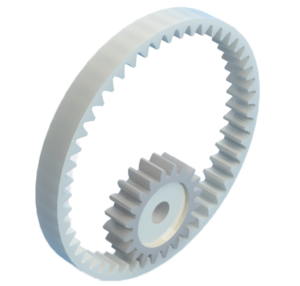
 Back
Back
